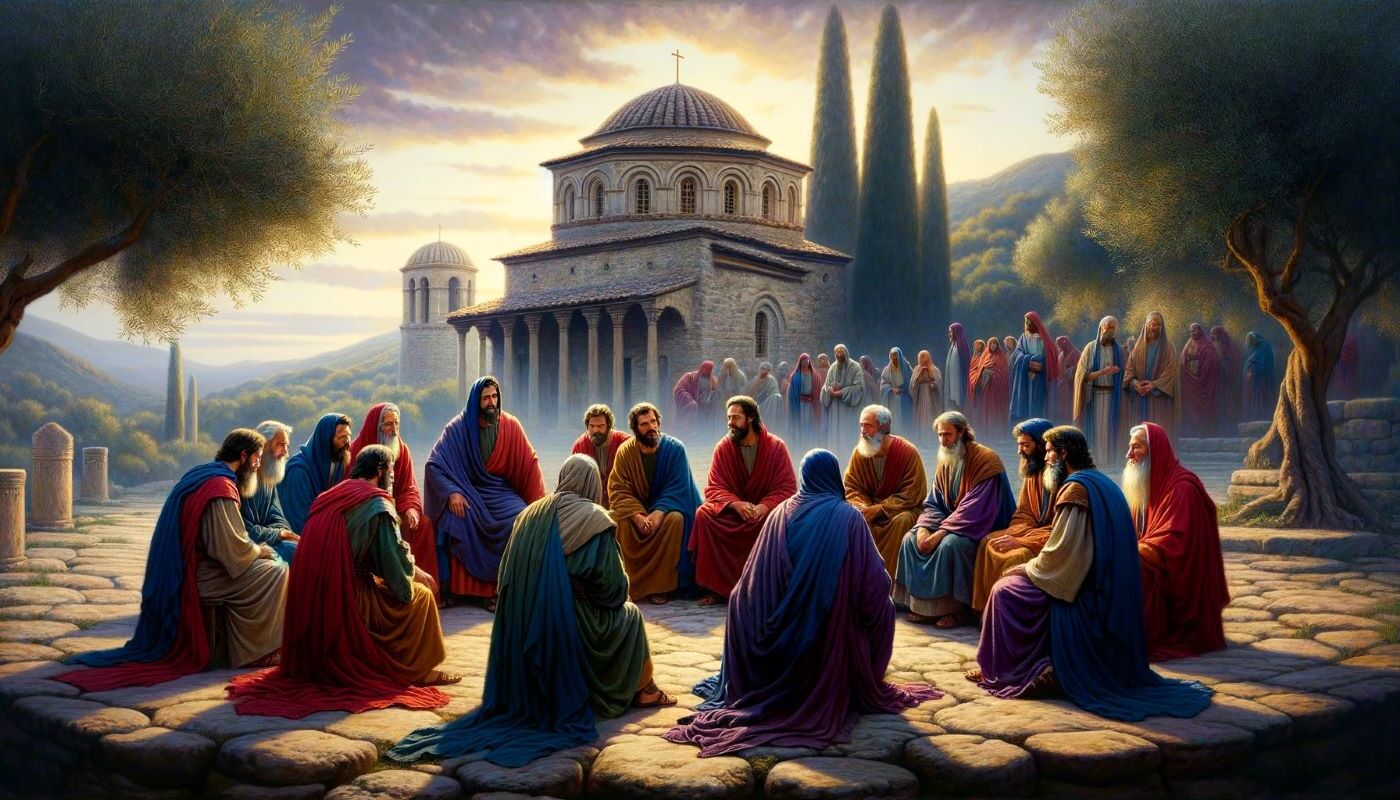
Who were the Apostles, and why do they matter? The Apostles were twelve men handpicked by Jesus Christ to spread his teachings and lay the foundation of the early Christian church. Their mission was to preach the Gospel, heal the sick, and cast out demons. Despite facing intense persecution, they played a crucial role in establishing Christianity, performing miracles, and writing parts of the New Testament. Figures like Peter, Paul, and John left a lasting legacy that continues to shape Christian doctrine and practice. Understanding their lives and contributions offers a deeper appreciation for the roots of Christianity and its enduring impact.
Who Were the Apostles?
The Apostles were a group of twelve men chosen by Jesus Christ to spread his teachings and establish the early Christian church. Their lives, roles, and contributions have left a lasting impact on Christianity.
-
Definition of an Apostle: An Apostle is a messenger or someone sent on a mission. In Christianity, it specifically refers to the twelve men chosen by Jesus to be his emissaries.
-
The Twelve Apostles: The twelve Apostles are Simon Peter, Andrew, James the Greater, John, Philip, Bartholomew, Thomas, Matthew, James the Lesser, Simon the Zealot, Judas Iscariot, and Matthias, who replaced Judas after his betrayal.
-
Selection Process: Jesus deliberately chose his Apostles. According to Matthew, he called his first disciples while they were fishing, and they immediately followed him.
-
Mission and Commission: Jesus commissioned the Apostles to preach the Gospel, heal the sick, and cast out demons. This mission is detailed in Matthew 10 and Luke 9.
Their Mission and Contributions
The Apostles were tasked with spreading Jesus' teachings and establishing the early Christian church. Their mission involved preaching, performing miracles, and facing persecution.
-
Teaching and Preaching: The Apostles were instructed to spread Jesus' teachings to all nations, focusing on the kingdom of God and salvation through faith in Jesus.
-
Miracles and Healings: They performed many miracles and healings, showcasing God's power. For instance, Peter healed a lame man at the temple gate.
-
Persecution and Suffering: Despite their mission, the Apostles faced intense persecution. They were arrested, beaten, and even martyred for their faith. Stephen, one of the early deacons, was stoned to death.
-
Apostolic Succession: The concept of apostolic succession suggests that the Apostles' authority was passed down through the bishops of the early Christian church, a tradition that continues in many denominations today.
Establishing the Early Church
The Apostles played a crucial role in organizing and guiding the early Christian community, helping to resolve disputes and provide spiritual leadership.
-
Role in Early Christianity: They helped organize the community, resolve disputes, and provide spiritual guidance, laying the foundation for the early church.
-
Council of Jerusalem: One significant event was the Council of Jerusalem, where the Apostles and other leaders discussed the relationship between Jewish and Gentile believers.
Paul the Apostle
Paul, also known as Saul of Tarsus, was not one of the original twelve Apostles but became a prominent figure through his conversion and missionary work.
-
Paul the Apostle: Paul became a prominent Apostle through his conversion experience on the road to Damascus. He wrote numerous letters that are now part of the New Testament.
-
Paul's Missionary Journeys: Paul undertook several missionary journeys, spreading Christianity throughout the Mediterranean world. His journeys are documented in Acts and his letters.
-
Theological Contributions: Paul made significant theological contributions, including the concept of justification by faith alone and the importance of grace over works.
Apostolic Writings
The writings attributed to the Apostles form a significant part of the New Testament, providing guidance and teachings for the early Christian community.
-
Apostolic Writings: These include the Gospels, the Acts of the Apostles, and the Epistles of Paul and other early Christian leaders.
-
Gospel of Matthew: Believed to be written by Matthew, one of Jesus' twelve Apostles, it emphasizes Jesus' fulfillment of Old Testament prophecies and his role as the Messiah.
-
Gospel of Mark: Thought to be written by John Mark, a companion of Peter and Paul, it focuses on Jesus' actions and teachings, highlighting his authority and power.
-
Gospel of Luke: Attributed to Luke, a companion of Paul, it emphasizes Jesus' compassion and love for all people, including the marginalized.
-
Gospel of John: Believed to be written by John, one of Jesus' twelve Apostles, it explores Jesus' divinity and provides a more theological perspective on his life and teachings.
-
Acts of the Apostles: Written by Luke, it chronicles the early Christian church from Jesus' ascension to Paul's imprisonment in Rome, highlighting the spread of Christianity.
-
Pauline Epistles: Paul's letters to various churches and individuals are part of the New Testament, including Romans, Corinthians, Galatians, Ephesians, Philippians, Colossians, Thessalonians, Timothy, Titus, Philemon, and Hebrews.
-
General Epistles: Attributed to other early Christian leaders like James, Peter, Jude, and John, these provide additional guidance and teachings for the early Christian community.
Apostolic Succession and Influence
The concept of apostolic succession and the influence of the Apostles continue to shape various Christian denominations and practices.
-
Apostolic Succession in Catholicism: In Catholic tradition, the authority of the Apostles is passed down through the bishops. The Pope is considered the successor of Saint Peter.
-
Apostolic Succession in Eastern Orthodoxy: Eastern Orthodox churches also believe in apostolic succession but emphasize maintaining traditional practices and sacraments.
-
Apostolic Succession in Protestantism: Protestant denominations generally reject apostolic succession, emphasizing the authority of Scripture and individual interpretation.
Role in Sacraments and Church Governance
The Apostles are often associated with the institution of sacraments and played a significant role in governing the early Christian church.
-
Role in Sacraments: The Apostles are linked to the institution of sacraments like baptism and the Eucharist. Jesus commissioned them to baptize people in his name.
-
Role in Church Governance: They helped establish rules and regulations for community life, playing a significant role in governing the early Christian church.
-
Councils and Synods: The Apostles convened councils and synods to address theological disputes and make decisions about church practices.
Facing Persecution and Spreading the Faith
The Apostles faced persecution under Roman rule but remained committed to spreading Christianity through evangelism and missionary work.
-
Persecution Under Roman Rule: The Apostles faced persecution under Roman rule, with many being martyred for their faith, including Stephen and James the Greater.
-
Role in Evangelism: They were instrumental in spreading Christianity through evangelism, preaching to both Jews and Gentiles, and establishing communities of believers.
-
Missionary Work: Missionary work was central to their mission, traveling extensively to preach about Jesus Christ and establish churches.
Teaching Authority and Spiritual Leadership
The Apostles held significant teaching authority and provided spiritual leadership to the early Christian communities.
-
Teaching Authority: Their writings and teachings were considered authoritative because they were directly commissioned by Jesus.
-
Spiritual Leadership: They guided believers through times of persecution and helped them understand their faith more deeply.
Miracles, Community Building, and Theological Debates
The Apostles performed miracles, built communities, and engaged in theological debates to shape the early Christian church.
-
Miracles and Signs: They performed miracles and signs that authenticated their message, helping to convince people of Jesus' divinity.
-
Healing Ministry: Many Apostles had a healing ministry, demonstrating God's power through miraculous healings.
-
Community Building: They played a crucial role in building communities of believers, establishing rules for community life, resolving disputes, and providing spiritual guidance.
-
Theological Debates: The Apostles were involved in various theological debates within the early Christian church, discussing issues related to Gentile believers.
-
Councils and Decrees: They convened councils to make decrees about church practices and resolve theological disputes, shaping the early Christian church's doctrine and practices.
Martyrdom and Legacy
Many Apostles were martyred for their faith, leaving a legacy that continues to influence Christianity today.
-
Martyrdom: Many Apostles were martyred for their faith, including Stephen and James the Greater, serving as a testament to their commitment to Jesus Christ.
-
Legacy: Their legacy continues to influence Christianity, with their writings, teachings, and actions shaping the faith into what it is today.
Influence on Liturgy, Doctrine, and Sacramental Theology
The Apostles' teachings have influenced liturgical practices, doctrine, and sacramental theology within various Christian denominations.
-
Influence on Liturgy: Their teachings have influenced liturgical practices, such as the Eucharist, often associated with Jesus' institution of this sacrament during the Last Supper.
-
Influence on Doctrine: Their writings have shaped Christian doctrine, addressing theological issues and providing guidance on matters like salvation, grace, and faith.
-
Role in Sacramental Theology: The Apostles played a significant role in sacramental theology, particularly regarding baptism and the Eucharist, seen as essential for spiritual growth and salvation.
Historical and Cultural Impact
The Apostles' historical and cultural significance extends beyond their immediate roles within early Christianity, influencing art, literature, and more.
-
Historical Significance: Their historical significance extends beyond their immediate roles, helping to establish a global faith that continues to evolve while maintaining core principles.
-
Cultural Impact: Their teachings have influenced art, literature, music, and other forms of creative expression throughout history.
-
Enduring Legacy: The enduring legacy of the Apostles serves as a reminder of their profound impact on human history, inspiring generations of believers worldwide.
The Lasting Impact of the Apostles
The Apostles left an indelible mark on Christianity. Their teachings, miracles, and sacrifices laid the foundation for the faith. From Simon Peter to Paul, each played a unique role in spreading Jesus' message. They faced persecution, performed miracles, and wrote texts that still guide believers today. Their legacy lives on in church traditions, sacraments, and doctrines. The Council of Jerusalem and their missionary journeys helped shape early Christianity. Their influence extends beyond religion, impacting art, literature, and culture. Understanding their contributions provides a deeper appreciation for the faith's rich history. The Apostles' commitment continues to inspire generations, ensuring their story endures. Their role in establishing the early church and spreading the Gospel remains a cornerstone of Christian history. Their enduring legacy is a testament to their unwavering faith and dedication.
Was this page helpful?
Our commitment to delivering trustworthy and engaging content is at the heart of what we do. Each fact on our site is contributed by real users like you, bringing a wealth of diverse insights and information. To ensure the highest standards of accuracy and reliability, our dedicated editors meticulously review each submission. This process guarantees that the facts we share are not only fascinating but also credible. Trust in our commitment to quality and authenticity as you explore and learn with us.


